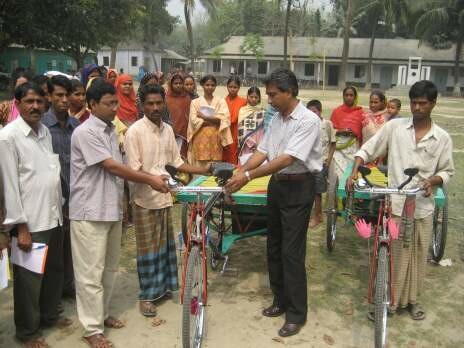
Two major disasters which strike on an annual basis are cyclones and floods, affecting millions of people and creating challenges for their security and livelihoods. The occurrence of major earthquakes can also have catastrophic consequences due to the dense population of Bangladesh and the unstable buildings and infrastructure in its major cities.
Due to the increase in the frequency of natural disasters in Bangladesh, the national government has been working together with the Bangladesh Red Crescent Society (BDRCS) to improve the country’s national disaster management framework. The IDRL Asia-Pacific team recently spoke with Mr. Nazmul Azam Khan, who has been the Disaster Management Coordinator for the BDRCS for the past 25 years, about the wave of change in national disaster management legislation in Bangladesh and the important role of the BDRCS in this development.
Mr. Nazmul Azam Khan noted that the Standing Orders on Disasters in Bangladesh (1998) were revised in 2010 and are very valid for the range of work which the National Society undertakes in this area. They cover responding to disasters, preparing for disasters and working for sustainable post-disaster activities. However, the IFRC Country Representative in Bangladesh, Udaya Regmi, argues that they do not properly address issues relating to climate change and the development of early warning systems, and that “with so many activities happening at different levels, confusions arise within the line ministries and district levels of government - who is responsible for what?”.
The proposed Disaster Management Act (DMA) is being drafted to enforce disaster management rules, regulations and mechanisms and standing orders, which will enable Bangladesh to better address these issues. A draft of the new DMA has been circulated to various local disaster responders, including the BDRCS, in order to solicit feedback and comments. Mr. Azam Khan informed the IDRL team that the National Society had “received the draft for comment at the end of June, and gave recommendations…we foresee that the draft will be passed during the next session of parliament”.
The current Standing Orders highlight the auxiliary role of the BDRS in disaster response activities, the official mandate of which is to complement the government’s efforts in case of emergency relief situations and enhance the development of disaster preparedness programs and planning. There are 16 major provisions under the Standing Order which assign BDRCS to undertake specific activities. For example, under the Cyclone Preparedness Programme (CPP), the National Society’s role includes the monitoring of 13 districts in the coastal areas, maintaining 175 shelters and disseminating early warning notifications.
Mr. Azam Khan stated that the BDRCS has played an important role in the formulation of the new act, putting forward suggestions to be incorporated into the new legislation, including terminology, a preamble the the new laws and provisions regarding crime and damages. He also went on to note that the specific legal barriers to the facilitation of international assistance which have been considered by the government in the development of the act include exemptions for taxes and ensuring the rapid expedition and quality of disaster assistance.
While the draft act is now in its final stages of development, the National Society is hopeful that the final version will reflect the changing needs and priorities for disaster response in Bangladesh, given the very real threat of disasters. The Chairman of the BDRCS, Dr. M.S. Akbar, and Vice Chairman Mr. Hafiz Ahammed Majumder are Members of the Bangladesh Parliament, which will provide an opportunity to further advocate for the inclusion of IDRL-related provisions in the new legislation. As highlighted by Mr. Nazmul Azam Khan, “BDRCS has a responsibility to respond and ensure better change is integrated into the domestic legislation….therefore IDRL issues should be incorporated in the proposed disaster management act”.